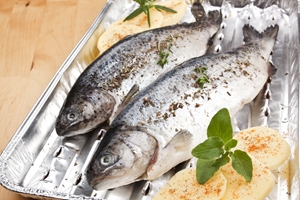A new study published in the American Journal of Clinical Nutrition this week gives fish-lovers new hope during pregnancy. For years, the U.S. Food and Drug Administration has cautioned expectant mothers against eating too much fish during pregnancy: not more than two servings of fish per week. This advice is meant to keep developing babies safe from the effects of mercury, a toxic chemical that’s found its way into our oceans and waterways. But now, after three decades of research by Rochester Ulster University in partnership with the Republic of Seychelles Ministry of Health and Education, the FDA may want to consider changing its tune.
The Seychelles Child Development Study is one of the largest and longest in its field. Over the course of 30 years, researchers tracked the growth, health, and development of 1,500 mother and child participants. These women all live in the Seychelles, a group of islands in the Indian Ocean that relies heavily on fish for its food supply. On average, the women in this study ate 12 fish-based meals each week. At 20 months old, participating babies showed no signs of neurodevelopmental problems, acing a battery of tests on their communication skills, behavior, and motor skills.
So, what’s the thought process behind this new study? Scientists believe that a compound found in fish may actually protect against these low levels of mercury exposure. The study concluded that the benefits of a fish-heavy diet may outweigh any risks mercury may pose.
How this study applies to you
Translated into practice, the results of this study can have direct implications on women who want to eat more fish during pregnancy, here in the U.S. Talk to your doctor or midwife about adding more fish to your plate to benefit your growing baby. Fish is rich in essential fatty acids and has a host of beneficial nutrients, all of which are particularly helpful to baby’s brain and tissue development.
As we recently reported, a 2004 research study showed that women who consumed higher levels of docosahexaenoic acid – an essential fatty acid found in fish – birthed babies with higher attention spans who reached developmental milestones faster.
Eating fish during pregnancy: what next?
As with any dietary changes you wish to make during pregnancy, talk to your doctor or midwife. While the FDA already recommends that pregnant women consume 8-12 ounces of fish each week, you may consider upping your intake. We suggest sticking to the FDA’s guidelines and steering clear of the most mercury-laden fish such as swordfish, shark, and mackerel. Instead, look to more healthful varieties such as salmon, shrimp, and tilapia.
What will you do now that you’re armed with this information? Thinking about adding more fish to your diet? Start a discussion in the comments below!
